The climate crisis is getting worse. Extreme weather events are hitting many regions of the planet with intensity and frequency attributed to the accelerating collapse of the climate. Characteristically, the Secretary General of the UN declares: “the climate crisis is over, we have entered the time when the world is boiling”. The climate crisis and the threat of extinction of many species come to meet the islands with a series of other problems: over-tourism, over-building, weak social infrastructure, a rapidly changing landscape, water problems, occupation of beaches by sunbeds and coastal degradation ecosystem, an agriculture that is shrinking for many reasons and increasing the risk of a food crisis.
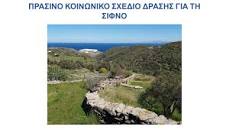 And yet there are suggestions and solutions. In this logic, the Wind of Renewal – the social cooperative enterprise for the promotion of the green and social economy – prepared through a participatory process a comprehensive proposal for a GREEN SOCIAL ACTION PLAN for Sifnos, as a proposal for the transition of the island to a more green and socially just and resilient model, with the role of the social economy being particularly important. The GREEN SOCIAL ACTION PLAN for Sifnos was formed within the framework of the GRAPE – COSME program in which ANEMOS ANNEOSSIS and the Municipality of Sifnos participate.
And yet there are suggestions and solutions. In this logic, the Wind of Renewal – the social cooperative enterprise for the promotion of the green and social economy – prepared through a participatory process a comprehensive proposal for a GREEN SOCIAL ACTION PLAN for Sifnos, as a proposal for the transition of the island to a more green and socially just and resilient model, with the role of the social economy being particularly important. The GREEN SOCIAL ACTION PLAN for Sifnos was formed within the framework of the GRAPE – COSME program in which ANEMOS ANNEOSSIS and the Municipality of Sifnos participate.
The GREEN SOCIAL ACTION PLAN for Sifnos was prepared by ANEMOS ANANEOSIS / WIND OF RENEWAL as a proposal to the Municipality, the stakeholders, institutions and citizens of Sifnos but it can, when completed, be a pilot for similar action plans for other islands. The proposal is the result of diagnosis, SWOT analysis, research, several discussions, workshops and conferences, for 2 years, but also the utilization of good practices from other similar regions, especially the regions of the GRAPE program partners and small islands participating in the SMILO network.
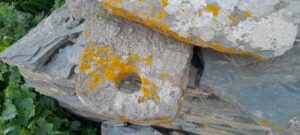 The objective of the Action Plan
The objective of the Action Plan
The aim of the Action Plan is to launch a debate on strategic issues for the future of Sifnos and in general small islands that have similar issues. And to help address them through a strategic green and social transition towards a more sustainable and resilient model.
What we know as a small island, society, landscape and environment is in a process of transition and change without having discussed the various dynamics that drive the changes nor in which direction the citizens of Sifnos want these changes to be directed. The same is true for many other islands.
The Action Plan includes findings and proposals that may be familiar to many residents as they are widely discussed and captured in the SWOT analysis, but these issues must be addressed in a systematic, organized and coherent manner.
Evidence is presented regarding the impact of the climate crisis on the Eastern Mediterranean and Sifnos (reduction of rainfall, reduced crop yields, heat waves, increase of sea temperature etc.) as well as phenomena that have not yet discussed among the local community, such as the gradual expansion of invasive species in the marine ecosystem of Sifnos, such as the German-salpa fish with toxic fins, the lionfish and the toxic lagocephalus sceleratus that are likely to dominate other fish species in the future and shrink the algae. Also presented are data, obtained from a recent on-site recording in the context of a research program, for the shrinkage by 50-89% depending on the areas examined, of the Posidonia meadows as a result of the moorings of tourist boats in the bays of Sifnos (Faros, Platy Gialos, Vathi). Further research is also needed on the long-term effects on the marine ecosystem from the recent increase in sea temperature. And of course, a strategy and good practices for climate adaptation is very urgent.
Key elements of the Action Plan of concern are: the landscape, land uses and the gradual reform of the tourist model from summer tourism (which will shrink in some years due to the heatwaves and high temperatures that will prevail in summer), the uncontrolled and unplanned promotion towards a sustainable “cool tourism”, mainly in spring and autumn, which will respect the island’s strengths and will mainly focus on forms of:
– ecotourism , given that the in good condition and unique for an island NATURA area, the network of 200 km of paths, the water paths (springs, wells, watermills, gournes / water tanks, the traditional fair and sustainable water sharing system etc) and the numerous herbs and aromatic plants of the island are a material basis that can support such a model,
– agritourism, which will also help in the recovery of agriculture, using the important tradition of gastronomy and cultivation of local seeds and varieties, a model of traditional agriculture that is very close to those of ecological agriculture and the european strategy “from farm to fork”
– cultural tourism, following the paths of pottery workshops, ancient towers, windmills and watermills (and their technology), traditional – bioclimatic settlements, buildings of great importance (agricultural buildings, churches and monasteries) as well as numerous mines.
There are suggestions for:
– regenerative agriculture in Sifnos, the importance of local seeds but also the contribution of olive cultivation, the preservation of drystones and the protection of nature and healthy soil to climate protection,
– new environmental roles for farmers and other professions in the context of the green transition.
The climate crisis and adaptation to the new climate conditions – Energy transition
The Action Plan also includes serious issues that have hardly been discussed in Sifnos, such as the effects of the climate crisis in the Mediterranean and consequently in Sifnos based on the most up-to-date studies and findings of scientific studies and international organizations. Or about the need for organized preparation and adaptation of Sifnos (and of course not only Sifnos and the islands) to the new climate conditions that are becoming more and more extreme and will affect all aspects of life and the economy in the coming decades.
2023 is a turning point. In the summer and autumn of 2023 we experienced very intense weather phenomena in various Mediterranean (and not only) countries. Greece is also affected by very high temperatures, by wildfires and large floods that tested the strength of all the country’s structures as well as its infrastructure. The social and economic damage is enormous and a large part of the country (Evros, Thessaly) will need years to recover, while other areas have suffered unprecedented disasters in recent years (Evia, Rhodes, etc.). After 2023 nothing will be the same. In other words, we have entered the era where crises are the new normality and societies have not prepared for it.
In the Action Plan, proposals are formulated for the participation of Sifnos in the energy and green transition, and the exit from fossil fuels by 2035.
In addition to the proposals made for the acceleration of energy efficiency and the shift to adapted applications of renewable energy sources, as well as the signing of cooperation agreements between the Wind of Renewal and the other partners of the program in matters of energy and green transition, social resilience and agro-food sector, two innovative proposals are also made for the creation of:
– an open climate ecological laboratory where the changes that take place in the island ecosystem and especially in the NATURA region due to the climate crisis will be monitored systematically and over time, and good climate adaptation practices will be researched, utilizing solutions based on nature based solutions)
– an open laboratory for the search and testing of energy applications of renewable energy sources that are best suited, adapted to the characteristics of small and medium-sized islands.
The role of drystone in relation to regenerative agriculture, soil protection, groundwater enrichment, defense against extreme weather events and cultural heritage
The Action Plan highlights two new approaches:
– Recovery of cultivation and agriculture in general in Sifnos, through highlighting its role in climate protection (e.g. absorption of greenhouse gases through olive cultivation or healthy soil) as well as in the restoration of nature and the preservation of genetic diversity (recording and strengthening the cultivation of local seeds and varieties that we have recorded under the SMILO-MED program and the Action Plan under GRAPE)
– Maintenance of the drystones walls network in the context of an essential policy of climate mitigation and adaptation, tackling the climate crisis and strengthening the defense against extreme weather phenomena (resilience) . However, the local society needs training, transfer of know-how and knowledge as well as (new) financial and other tools for the maintenance of a network of 2-3000 km of drystone walls which is the work of several thousand years (since antiquity) but also of tens of thousands of people. The knowledge and techniques of drystone walls have been included in the Intangible World Cultural Heritage of the relevant UNESCO list.
One of the proposals being explored is the creation of an “autumn school for drystone walls techniques” for the theoretical and practical training of those interested, based in Sifnos, and the organization of similar actions in other islands. This proposal comes to respond to the need not to lose the still existing knowledge and experience but also to the “demand” that exists for such an institution, as shown by the 3-day workshop and the discussions on drystone walls its importance organized by Wind of Renewal in Sifnos 24-26/10/2023, with the participation of at least 40 interested parties from other islands of the Cyclades.
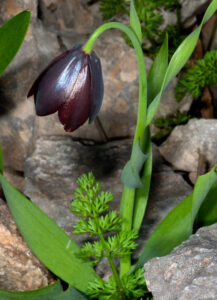 Protection and sustainable management of the natural wealth and the NATURA area of Sifnos
Protection and sustainable management of the natural wealth and the NATURA area of SifnosSifnos has a very interesting natural area (NATURA 2000). The Action Plan highlights proposals so that its protection and management contribute not only to the preservation of the important ecosystem but also to the creation of green jobs and the well-being and sustainable future of the entire island.
The great importance of the social economy for the green transition, strengthening social structures and upgrading the capabilities of the local community
The Action Plan contains proposals regarding the role of the social economy in support of:
– climate policy
– regenerative agriculture,
– social services, especially the creation of new care services for the elderly who face many problems,
– resilience to new health threats accompanying climate collapse,
– the green transition, environmental infrastructure, eco-tourism and guided tours, protection and management of the Natura area and natural resources
– the shift towards a more sustainable model of tourism, guided tours and the creation of new itineraries (cultural, local production, ancient technology, etc.)
– supporting structures for the local community and finding financial tools to support the changes required in terms of education, training, investments for the green transition, exploring (new) sources of funding for green infrastructure and social structures.
The next steps
The Action Plan was made public in early August for comments and additions. It was sent to over 100 people who had participated in various phases of consultation. It was made known through the Newsletter that Anemos Anenoiosis sends to approximately 4000 people as well as through social media.
Key elements of the Action Plan were also presented publicly at various opportunities:
– Conference “Agriculture and new farmers” – Sifnos 15-17 of September: presentation: “Regenerative traditional agriculture, cultivation of local species, conservation of drystones walls: their contribution to mitigating the climate crisis and protection against extreme weather events – Proposals in the framework of the GREEN SOCIAL ACTION PLAN for Sifnos – GRAPE and SMILO-MED programs”
– 3 days events for maintenance of dry stone walls (workshop on the field, films presentation and discussions) – Sifnos 24, 25,26 of October,
– Conference on Landscape of Sifnos – 27 October 2023).
Articles about the Action Plan were published in local news sites such as:
– kaipoutheos here and here
– other sites here, here, here, here, here
The full text of the Action Plan on a local news site here
After new observations and integration of the proposals submitted after its publication, the final GREEN SOCIAL ACTION PLAN for Sifnos will be officially presented to the new Municipal Council that takes over from 1/1/2024 and hopefully will be discussed in February 2024.
Proposals to the European institutions
The proposals contained in the GREEN SOCIAL ACTION PLAN for Sifnos do not bind the Municipality but only the authors nor the European Commission.
Taking into account the corresponding Action Plans of the other partners participating in the GRAPE program, a document with proposals and recommendations will be drawn up and addressed to the European Commission and the European Parliament. It will also address European networks related to issues discussed in the Action Plan, while also including good examples from Sifnos and other islands that could be used by the members of the SMILO small islands network.
 About the COSME – GRAPE programme
About the COSME – GRAPE programme
The GRAPE project, “Local Social Green Action Plans for Small and Regional Places”, aims to collaborate on social and green resilience strategies to promote local solutions to local problems. It is co-financed by the European Commission under the Single Market Program (SMP-COSME). It started in May 2022 and will be completed in October 2023.
It includes 4 small European municipalities from rural, mountainous and island areas: Malegno (Italy), Mirabella Imbaccari (Italy), Bonares (Spain), Sifnos (Greece). Each municipality is supported by a local social and solidarity economy body: Sol.Co Camunia (Malegno), Fondazione di Comunità di Messina (Mirabella Imbaccari), COOPINTE (Bonares) , Wind of Renewal / Anemos Ananeosis (Sifnos). These local partnerships are further supported by a European network, REVES – European Network of Cities and Regions for the Social Economy and FAECTA , the Andalusian network of cooperatives. This consortium is headed by the Community Foundation of Messina / Fondazione di Comunità di Messina (Sicily, Italy).
The project aims to identify and promote resilient strategies to address economic, energy and climate crises at the local level and chart pathways for a sustainable and equitable green and digital transition, developing local solutions for local needs. In this context, the Social and Solidarity Economy contributes to “territorial resilience” through the experimentation of innovative solutions based on solidarity, mobilizing local actors to cooperate and use their resources to adapt to the challenges they face.
The project “GRAPE – Local Social Green Resilience Action Plans for small and peripheral territories” is supported by the european program SMP-COSME-2021-RESILIENCE-SEM (G.A. 101074093).
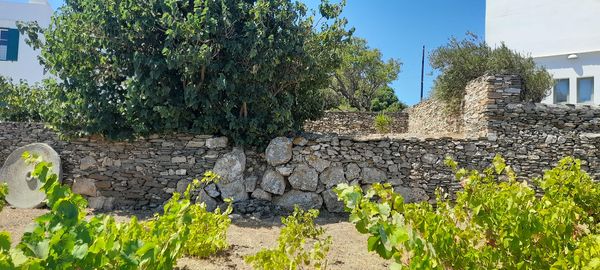
 And yet there are suggestions and solutions. In this logic, the Wind of Renewal – the social cooperative enterprise for the promotion of the green and social economy – prepared through a participatory process a comprehensive proposal for a GREEN SOCIAL ACTION PLAN for Sifnos, as a proposal for the transition of the island to a more green and socially just and resilient model, with the role of the social economy being particularly important. The GREEN SOCIAL ACTION PLAN for Sifnos was formed within the framework of the GRAPE – COSME program in which ANEMOS ANNEOSSIS and the Municipality of Sifnos participate.
And yet there are suggestions and solutions. In this logic, the Wind of Renewal – the social cooperative enterprise for the promotion of the green and social economy – prepared through a participatory process a comprehensive proposal for a GREEN SOCIAL ACTION PLAN for Sifnos, as a proposal for the transition of the island to a more green and socially just and resilient model, with the role of the social economy being particularly important. The GREEN SOCIAL ACTION PLAN for Sifnos was formed within the framework of the GRAPE – COSME program in which ANEMOS ANNEOSSIS and the Municipality of Sifnos participate. The objective of the Action Plan
The objective of the Action Plan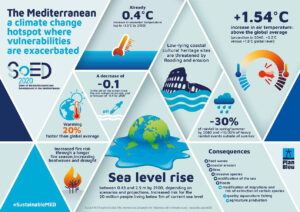
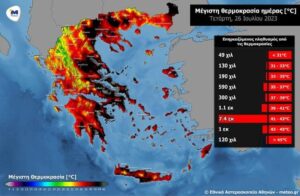
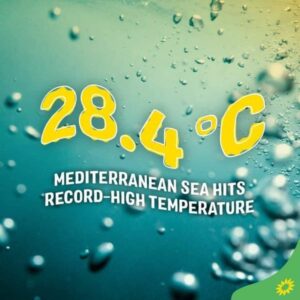
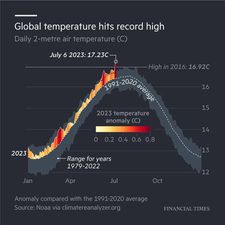
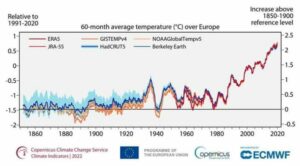
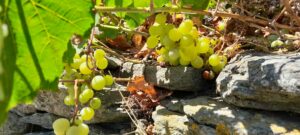
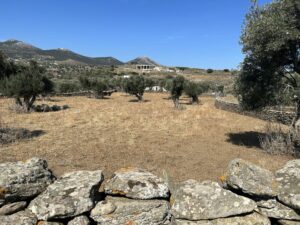
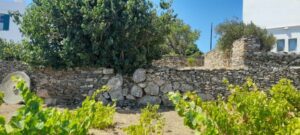
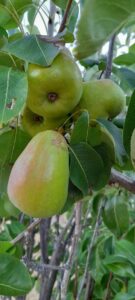
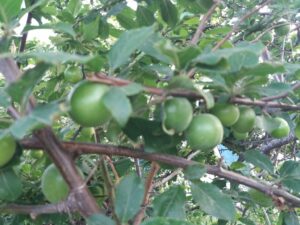
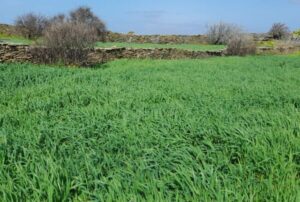
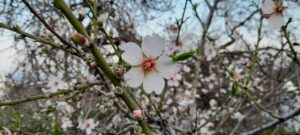
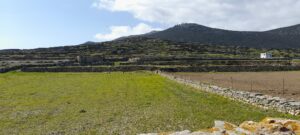
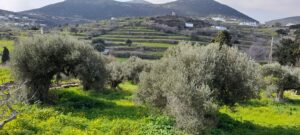
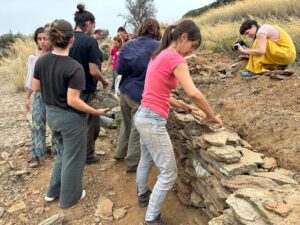
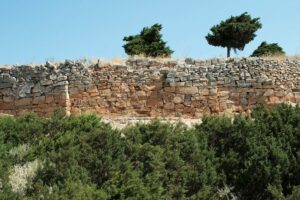

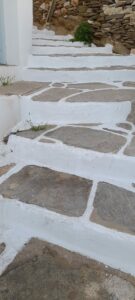
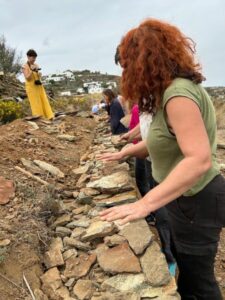
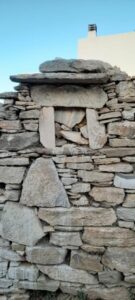
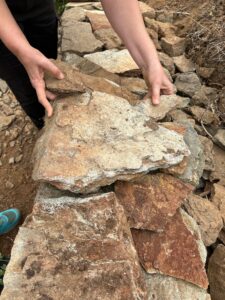
 Protection and sustainable management of the natural wealth and the NATURA area of Sifnos
Protection and sustainable management of the natural wealth and the NATURA area of Sifnos About the COSME – GRAPE programme
About the COSME – GRAPE programme
